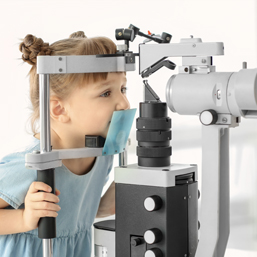
It often comes as a shock to parents when they learn from their optometrist that their child is struggling to see.
“I’ve had parents break down in my exam room because they had no idea their child was struggling,” says Calgarian optometrist Dr. Farrah Sunderji.
What is important to learn from these experiences is that, as parents, we should not take it for granted that our children see well. Vision problems can be hard to spot, particularly if there is a problem in only one of the eyes.
You can’t assume your child has healthy eyes because they have passed a vision screening or are not complaining – more than 43 percent of children who have a vision or eye health problem can pass a basic vision screening. Your child may not realize they have a vision problem as they may simply assume everyone sees the way they do. It’s all they know.
Some of the signs and symptoms parents can watch for include:
As parents actively prepare for the next school year, consider a comprehensive eye exam with a doctor of optometry.
“These exams take approximately 20 minutes and can confirm (your child’s) eyes are healthy and there are no vision impairments. Plus, they set a marker for optometrists to gauge any changes in vision or eye health as the child grows,” says Dr. Sunderji. “Research tells us that one in four school-aged children has a vision problem and we know 80 percent of learning is visual for a child. That’s reason enough to book a yearly eye exam.”
It is important to remember that the earlier an eye health or visual problem is identified, the more likely it can be corrected. Taking the whole family for an eye exam is a prudent measure to eye health, and it can never start too early.
Optometrists recommend that babies have their first eye exam between six and nine months, which proved to be critical to little Noah. His mom, Alyssa, noticed he wasn’t focusing or engaging with his surroundings in the same way that her daughter had as a baby of six months. She booked an eye exam with their family optometrist, Dr. Sunderji.
This first eye exam identified a critical issue with Noah’s vision and, as a team, they set to work to get Noah the help he needed. Had the vision issue been left untreated, Noah’s vision could have been permanently impaired.
“Once Noah had his glasses, his whole personality changed. He became the active, curious baby I knew he was,” said Alyssa. “Our whole family sees Dr. Sunderji and I’m glad I had this connection, so I felt comfortable reaching out when I thought there was a problem.”
There is Alberta Health coverage available towards eye exams for children until their 19th birthday. If your child is in kindergarten, they can take advantage of the Eye See…Eye Learn™ program where if the exam identifies they require glasses they will be provided free of charge.
To find an optometrist close to your home, visit optometrists.ab.ca and click on Find an Optometrist and enter your postal code. You will also find lots of vision and eye health information for all ages on this site.
For more information about your family vision and eye health care, visit optometrists.ab.ca.
See our related articles:
Calgary’s Child Magazine © 2024 Calgary’s Child